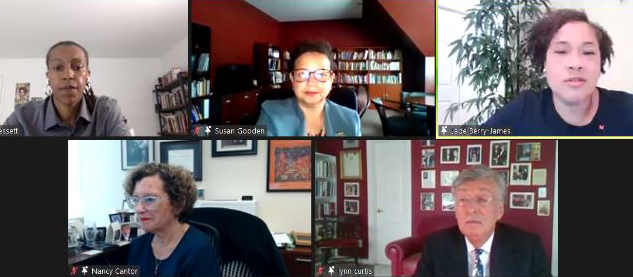News
The Role of Public Affairs Higher Education in Terminating Racism and Healing Our Divided Society

June 15, 2021
By Briana Williams
Fifty-three years ago, the Kerner Commission concluded that poverty and institutionalized racism had created a divided society—"one black, one white—separate and unequal"— a society that had culminated in the devastating riots of the late 1960s. Their report cited education as a critical lever for achieving equity and called for “a new will” to enact sweeping policy changes in education, labor, education, housing and policing that were never implemented.
Last week, higher education leaders and public administration scholars gathered to revisit the recommendations of the commission and to critique the role of the academy in advancing the work of public administrators in terminating racism and inequality. Sponsored by the Eisenhower Foundation and the Andrew W. Mellon Foundation, the panel included Wilder School Dean Susan T. Gooden, Dr. Alan Curtis President/CEO of the Milton S. Eisenhower Foundation, Dr. Brandi Blessett (University of Cincinnati), and Chancellor Nancy Cantor (Rutgers University - Newark). Dr. RaJade M. Berry-James, an associate professor at NC State University moderated. Panelists were asked to respond to the overarching question,” How can senior university leadership and faculty institute new will and better prepare students to heal our divided society?”
Past vs. Present: Not Much Has Changed
Reflecting on the history of our country, and the impact of the Black Lives Matter movement and the COVID-19 Pandemic, the panel emphasized that there is still much more work to be done when it comes to racism and equality.
“With the pandemic making everything worse…we need more. How can universities do more to heal our communities?” asked Curtis.
Blessett shared that today’s data points in disparities are as dire as those examined by the Kerner Commission in 1968. She spoke of evident inequities in policing and in proposed voter legislation and acknowledged that we still have the “first people of color” serving in numerous positions of authority within the federal government.
“Laws that have been in place for decades were designed to provide equality for all but have fallen short," said Blessett. “Systemic discrimination is denying black people to the so-called American dream.”
Each panelist cited the senseless killings of young Black people, such as Breonna Taylor, George Floyd and numerous others as well as the disproportionate number of minority fatalities throughout the course of the pandemic.
“We live in two Americas in New Jersey. There are huge disparities among White, Blacks and Latinos,” said Cantor.
Blessett expressed growing concerns about complacency among policymakers as the country returns to normalcy and the focus on achieving a more equitable society wanes. Still, she is optimistic.
“The world that we know now does not have to be the world that we create for the future,” said Blessett
The Role of Our Schools Within the Community
There were many common areas of reflection and agreement among the panelists; one of which was the pivotal role of public affairs and administrators in sustaining the will to eliminate racism and fight inequality. There was also an overwhelming consensus that this work should be done first and foremost within colleges and universities.
“It’s high time that higher education unpacks our own discriminatory practices,” said Cantor.
Gooden, who is the co-editor of a special volume of the Russell Sage Foundation which examined the legacy of the Kerner Report, said that just as President Johnson did not thank the Kerner commissioners for fear of criticism and repercussions, schools are afraid to look within and criticize their own policies and actions that need to be addressed to better serve the community.
“Will or lack thereof provides a barrier for us all today. We as schools of public affairs and administration are not ready to get our own houses in order, just as President Johnson didn’t want to point the finger inward,” she said.
She also stressed the importance of direct interaction between policymakers and marginalized communities as a critical component to strengthening the political will for equality.
“During the 1960's, commissioners completed site visits to do research within the ghetto and talk to people, decreasing the social distance between 'us and them,' Gooden said. “When we are able to shorten the social distance, then it helps to encourage that ‘will’.”
Blessett expanded on this idea adding that there is a serious need for community members to be seen as experts through their lived experience to help change things.
“Let them tell their stories and be seen as legitimate knowledge. We need a people-centric model of education.”
Cantor said Rutgers University - Newark had been successful at incorporating the lived experience of students within community dialogues and encouraged scholars to engage directly with citizen voices to amplify their studies.
Preparing Our Next Leaders
Curtis, who is also the author of a recent book on the Kerner Commission, suggested that schools convene to better support and educate students on how to strengthen democracy and voting rights for the future.
“We need new best practices with fresh adults dedicated to healing our society. If you want to heal our divided society, there are relative few educational opportunities, said Curtis. “Students need to learn how to evaluate, communicate, advocate, and organize. Let’s inspire students to figure out how to restructure federal government.”
Gooden acknowledged that “we have continued segregation of opportunity in our schools, programs and universities” and that the focus needs to remain on student success with extra measures of support in place.
“Who we admit, who we help – have direct correlation to those hired into these positions in policy, government, etc. and ultimately shape our society,” she said.
“We must focus on making social equity matter, focus on moving forward, but leaving a legacy of equity and justice, different from how we’ve found it. We must demonstrate that will by doing it ourselves.”